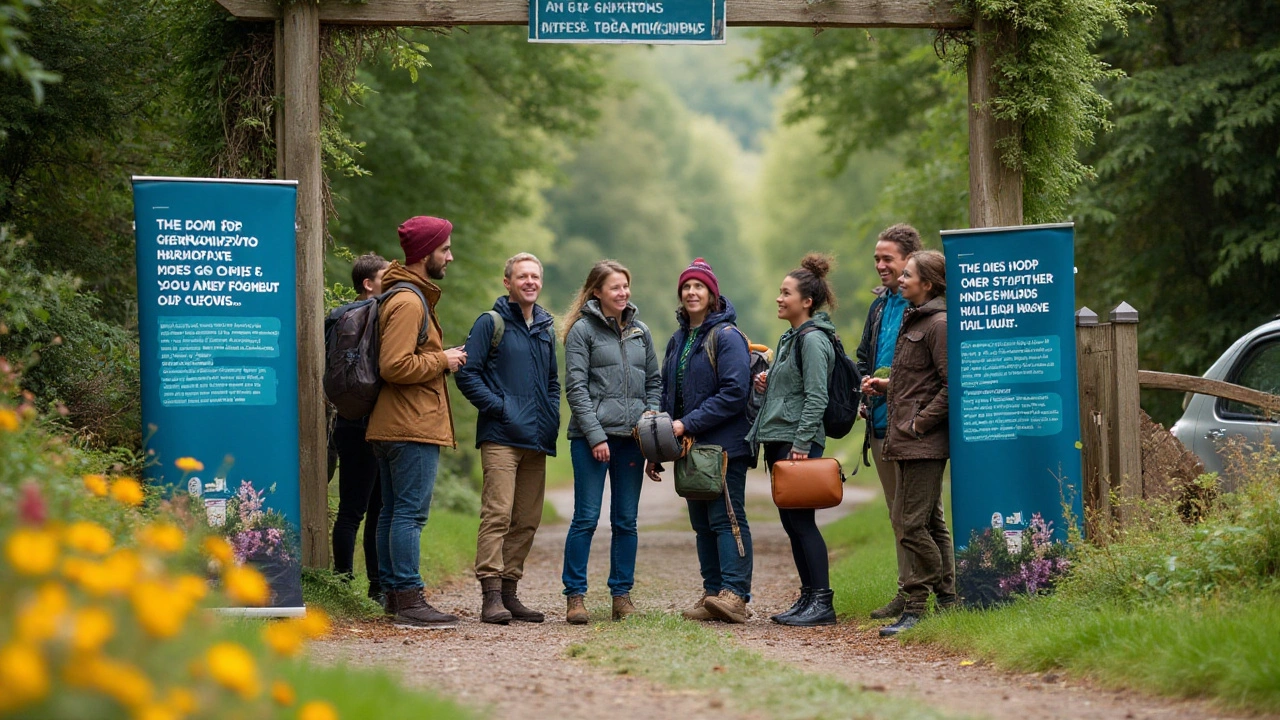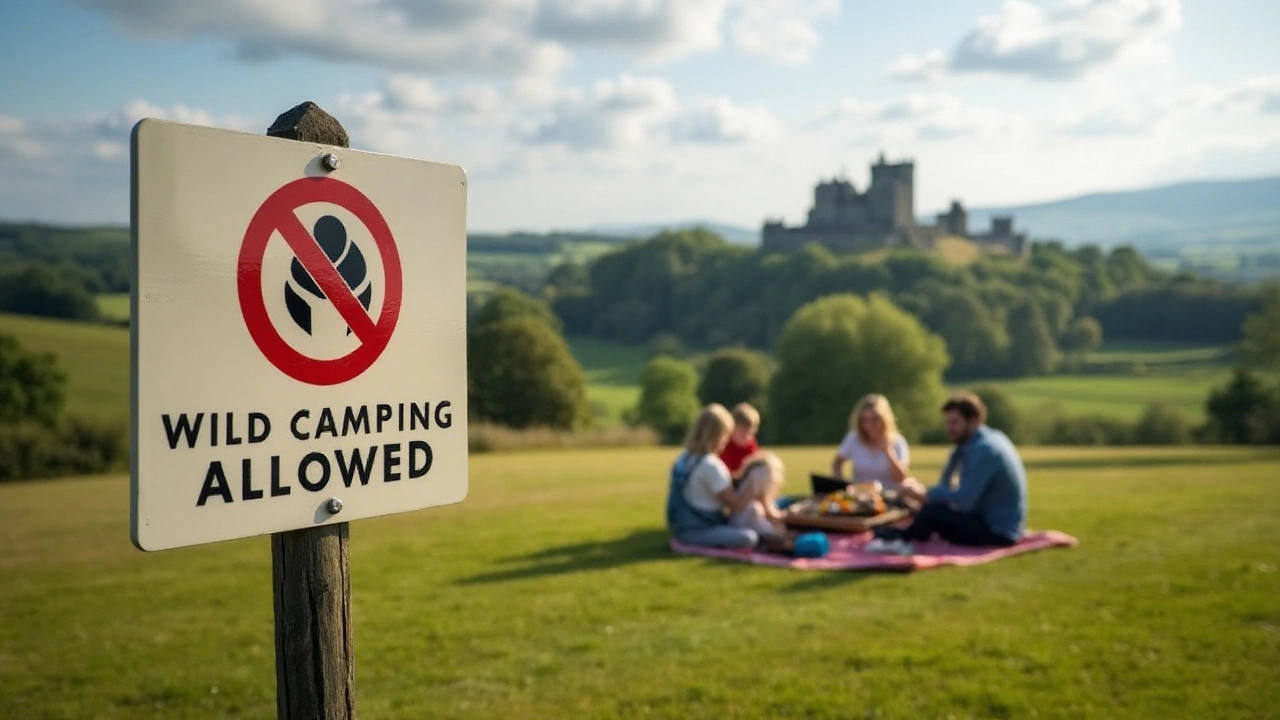Camping in the wild has often been romanticized as a way to truly connect with nature away from the buzzing crowds and overly managed sites. Yet, in England, pitching a tent in the countryside without proper permissions is technically illegal. This regulation leaves many outdoor enthusiasts wondering why such restrictions exist and how they could responsibly enjoy their adventure cravings.
The history of England's land laws, deeply rooted in past societal structures, continues to influence present-day camping restrictions. Reasons for the wild camping ban include not only legal issues but also insights into the protection of natural habitats and maintaining public order. However, fear not, there are legitimate ways to satisfy your camping desires within the framework of the law.
Understanding these considerations not only helps in adhering to regulations but also encourages sustainable practices while enjoying England's picturesque landscapes. More importantly, making informed decisions can lead to a harmonious relationship between campers and the environment they treasure.
- Historical Context of Camping Laws
- Current Legal Framework
- Environmental and Social Concerns
- Alternatives to Wild Camping
- Tips for Responsible Outdoor Activities
Historical Context of Camping Laws
Over centuries, the picturesque landscapes of England have been shaped by a profound history of land ownership and social hierarchy. These intricacies have left a lasting legacy on modern-day policies, including the strict regulation of wild camping in England. Historically, land was predominantly owned by the aristocracy, who maintained vast estates for their pleasure. This tradition harks back to the Norman Conquest of 1066 when William the Conqueror seized lands and redistributed them amongst his nobility. Rights to access and use these lands were limited, a precedent that tightly linked land ownership to privilege and status.
During medieval times, the enclosure movement in the 18th and 19th centuries further intensified these disparities, as common lands were fenced off and converted into private holdings. This left much of the countryside inaccessible to the general populace—a situation that remains partly intact today. The mass privatization of land not only changed the agricultural landscape but also how individuals could roam and reside across it.
The 1932 Mass Trespass on Kinder Scout, a pivotal moment in the history of English outdoor access, was a protest against these very restrictions, highlighting the growing public demand for greater recreational freedoms. Yet, despite the success of this movement leading to the creation of national parks and public paths, full freedom for unsupervised camping remains elusive. Customarily, permission must be sought from landowners, and failure to comply could result in being moved on or facing legal consequences. With regulations strengthening in socially sensitive areas, the need to seek appropriate pathways to indulge in nature is clear.
"The right to roam is a significant advancement, yet we must balance this with respect for landowners and conservation efforts," a spokesperson from The Ramblers, a prominent walking charity, mentioned.
Parliament introduced the Countryside and Rights of Way Act 2000 (CRoW), which granted walkers the right to explore designated areas without fear of trespass. However, these freedoms did not extend to the setting up of temporary dwellings like tents. The Act is symptomatic of a long-standing cultural and legal framework that prioritizes maintained pathways over unregulated exploration. As wanderlust modern adventurers seek out the tranquility of nature, these historical contexts highlight the roots of legal constraints they face today. Understanding this helps navigate not only the physical trails but also the societal routes to responsible enjoyment of the outdoors.
The Current Legal Framework
The legalities surrounding wild camping in England might seem tangled at first, but they serve a purpose that often aligns with environmental and land conservation goals. Under the Criminal Justice and Public Order Act 1994, it is considered trespassing to camp on private land without permission. England's land ownership is predominantly in private hands, meaning that wild campers must seek out the landowner's consent to avoid legal trouble. This law might not always seem friendly to the eager camping enthusiast, but its roots often lie in a patchwork of historical land ownership and stewardship that predate modern public recreation habits.
One of the most influential pieces of legislation is the Countryside Rights of Way Act 2000, commonly known as the CROW Act. While this act opened up unprecedented access to footpaths and vast areas of the countryside, including mountains, moors, heaths, and downs, it conspicuously left out a right often prized by outdoor adventurers: the ability to camp overnight in these areas. The CROW Act did not extend the legal right to camp in the wild, maintaining a distinction between paths for passing through and spaces for pitching a tent. This nuance remains a key intersection of law and personal freedom in outdoor pursuits.
The Role of Local Bylaws
In addition to national legislation, local bylaws present an additional layer of complexity for those seeking to camp outside designated caravan parks and campgrounds. These laws are designed with an eye toward balancing recreational use with the protection of public areas and amenities. While it might feel like another box to tick, obtaining the necessary permissions or understanding the restrictions at play can lead to a more fulfilling outdoor experience. Across various districts, these bylaws might prohibit camping outright or set specific restrictions based on environmental impact assessments. Navigational expertise and willingness to adhere to these local ordinances are crucial for the camping community staying on the right side of the law.
It's not just about legal prohibitions; landowners themselves play a significant role. Often, they factor in concerns regarding waste, fire risks, and the impact on livestock. Many larger estates exercise their rights to keep certain tracts off-limits to campers, bolstered by unofficial, but well-enforced norms. Might there be opportunities for camping within such frameworks? Absolutely, but dialogue and mutual respect form the cornerstone of any such arrangement.
According to a report from the Outdoor Recreation Network, "Understanding land restrictions and acquiring permissions not only safeguards individual outdoor pursuits but also greatly contributes to conserving the natural spaces cherished by future generations."
Balancing legal mandates and adventurous spirits seems like threading a needle, yet possible through both structured camping grounds that serve as an alternative and a proactive approach in seeking landowner partnerships. The current legal framework can offer both challenges and opportunities if viewed not just as a barricade to adventure, but as a guide to more sustainable encounters with nature.

Environmental and Social Concerns
The decision to ban wild camping in England stems from several environmental and social reasons that are vital for preserving the country’s natural habitats and maintaining community harmony. The countryside in England is home to a wide variety of wildlife and complex ecosystems. When individuals camp without adhering to guidelines, it can lead to unintended harmful consequences on these fragile landscapes. Trampled vegetation takes years to recover, and this damage disrupts the natural homes of countless animal species. It is important to note that camping bans aim to protect the ecological balance, allowing nature to thrive unhindered.
Social concerns also play a significant role in the restrictions on wild camping. The previous lack of control resulted in littered landscapes tarnishing the views of otherwise pristine environments. This irresponsible behavior tarnishes not only the aesthetic but also the safety of these zones for fellow nature lovers. Enforcing a camping ban offers a structured approach to outdoor activities, reducing the potential for conflicts with local communities and landowners who have witnessed firsthand the disorderly conduct associated with trespassing campers. The management of these areas thus becomes more feasible, ensuring their beauty and accessibility for future generations.
"It's in our hands to leave the world a little bit better than we found it," said renowned environmentalist Sir David Attenborough, emphasizing the need for responsible interaction with nature.
In recent years, an increase in outdoor activities has put a strain on popular natural spots. With more people than ever seeking solace among the trees or near tranquil streams, the potential damage has also surged. To prevent further degradation, regulatory bodies have had to crack down on activities that might contribute to the deterioration of these cherished landscapes. Guided by sustainability, they encourage enthusiasts to explore designated areas where proper facilities can handle the influx. Educating campers about the impact of their actions while promoting stewardship aligns individual pleasure with a collective responsibility.
Local authorities, environmental groups, and community stakeholders continually strive to create awareness programs that address these concerns, offering alternative ways to enjoy the countryside without harming it. Clearly marked paths, limited use zones, and visitor centers help guide those eager to absorb nature without leaving the wrong kind of footprint. Such initiatives emphasize the importance of respecting both the environment and the social constructs that preserve it. Ultimately, by comprehending the rationale behind the ban, everyone can play a part in safeguarding England’s landscapes for those who come after.
Alternatives to Wild Camping
When the allure of wild camping in England calls, it can be disappointing to realize the legal barriers in place. Yet, for those yearning to immerse themselves in nature without breaching the rules, there are several enticing alternatives. One popular choice is to explore designated campsites that provide a closer-to-nature experience while still adhering to legal constraints. Many of these sites offer basic facilities like compost toilets and water points but avoid the amenities that take away from a wilderness experience. England's vast network of national parks and Areas of Outstanding Natural Beauty often feature these campsites, giving adventurers plenty of options.
Delving deeper into the idea of regulated outdoor experiences, individuals might also consider backpacking along recognized trails that permit setting up camp overnight. The South West Coast Path or the Pennine Way, for example, allows hikers to plan extended trips where they can set camp at approved locations. This strikes a balance between the spirit of wild camping and compliance with the country's legal structure. By sticking to these trails, campers not only protect the environment but also contribute to local conservation efforts.
Another method of lawfully enjoying outdoor adventures is by seeking permission from landowners. In some cases, owners of private lands are open to granting access to their properties for camping. It allows for a personalized and unique experience much closer to the ideal of wild camping. The English countryside is dotted with hospitable landholders, some even offering curated experiences for nominal fees. Upon getting approval, campers can pitch their tents legally and often enjoy a one-of-a-kind view or secluded sanctuary.
"Sustainable camping practices are not just about following rules but making a conscious effort to protect what we love," says a report by the Outdoor Conservation Society.
For those who seek community and learning, organized camping events offer a hybrid between traditional camping and wild experiences. These gatherings typically take place on approved sites and emphasize activities like bushcraft, ecology education, and group excursions. While not wild in the purest sense, these events provide camaraderie among like-minded individuals and often lead to lifelong friendships. Tapping into these networks not only satiates one's camping desire but opens doors to the outdoors community, which can be enriching and fulfilling.
Lastly, as an innovative approach to modern camping, some companies have developed pop-up wilderness retreats that mimic the excitement of wild camping without the legal implications. These are temporary installations in overlooked nooks of natural landscapes, available for a limited period and designed to leave minimal environmental footprints. The retreats often include guided components, enhancing the experience by introducing campers to local wildlife, geography, and star-gazing opportunities. These options offer exciting engagement with nature in a legal, environmentally-friendly way, ensuring both wildlife and wild places remain unharmed for future adventurers.

Tips for Responsible Outdoor Activities
Embarking on outdoor adventures requires a thoughtful balance of enjoyment and preservation, especially in regions where camping regulations are strict. For those who love the unspoiled beauty of England's countryside, following these eco-friendly tips can make a significant difference. Firstly, understanding and respecting the land you're visiting is crucial. This involves recognizing protected areas and knowing which regions are private property. In England, much of the land is privately owned, and trespassing not only breaches legal boundaries but disrupts the ecological balance.
Before setting out, ensure you have the necessary permits if your destination requires one. Many areas offer a fantastic experience within legal bounds, such as designated camping sites that lie nestled in nature without harming it. While these might not provoke the same sense of wilderness as wild camping does, they provide a legal and environmental compromise that benefits all parties involved. Carry a map or use reliable navigation tools to avoid wandering into prohibited zones. Apps and online resources can often provide valuable insights into the land statutes and camping-friendly routes.
Leave No Trace
Adhering to the Leave No Trace principles is one of the most effective ways to engage in responsible outdoor activities. This concept revolves around minimizing the impact of your presence on the environment. It starts with planning ahead and preparing to ensure that your trek doesn't require aid from others or result in unintended interference with the natural habitat. Always camp on durable surfaces and, wherever possible, use existing trails and campsites. It might sound limiting, but it greatly reduces the footprint left behind. Respect wildlife and their habitats by keeping a safe distance, and never feed animals as it disrupts their natural foraging behaviors.
Keep waste to a minimum by packing out what you pack in. This means any trash, leftovers, or packaging should be carried back with you. Practice proper sanitation, ensuring that all human waste is disposed of appropriately. In some places, burying waste or using portable toilets may be recommended. Lighting campfires is another area of concern. Always check local regulations before lighting a fire since some areas prohibit this due to increased fire risks. Where fires are permitted, use established fire rings and ensure the fire is completely extinguished before leaving.
Embrace Sustainable Practices
Utilizing gear made from sustainable materials is a forward-thinking approach to reducing your environmental impact. The market now offers numerous eco-friendly alternatives ranging from tents to clothing, which reduce dependency on harmful chemicals and resources. Even small changes, like using reusable water bottles and containers, help in the grand scheme of things. While exploring these options, respect local communities by supporting local businesses. Shop at village stores, respect their traditions, and engage in meaningful ways that boost the local economy while you're there. Not only does this provide a richer experience, but it also helps nurture the very places we enjoy exploring.
Lastly, it is beneficial to educate oneself and others on responsible camping practices. Sharing knowledge with fellow adventurers helps in creating a culture of respect and preservation. Many organizations offer workshops and resources that expand on these tips, providing deeper insights into the ethics of wilderness interaction. Experts often stress the importance of being mindful of seasonal changes, as some times of the year might increase the risks to nature, like nesting seasons or times of drought. In one insightful discussion, renowned conservationist John Muir highlighted, "In every walk with nature, one receives far more than he seeks." Understanding this connection is vital for anyone looking to leave as light a footprint as possible.
